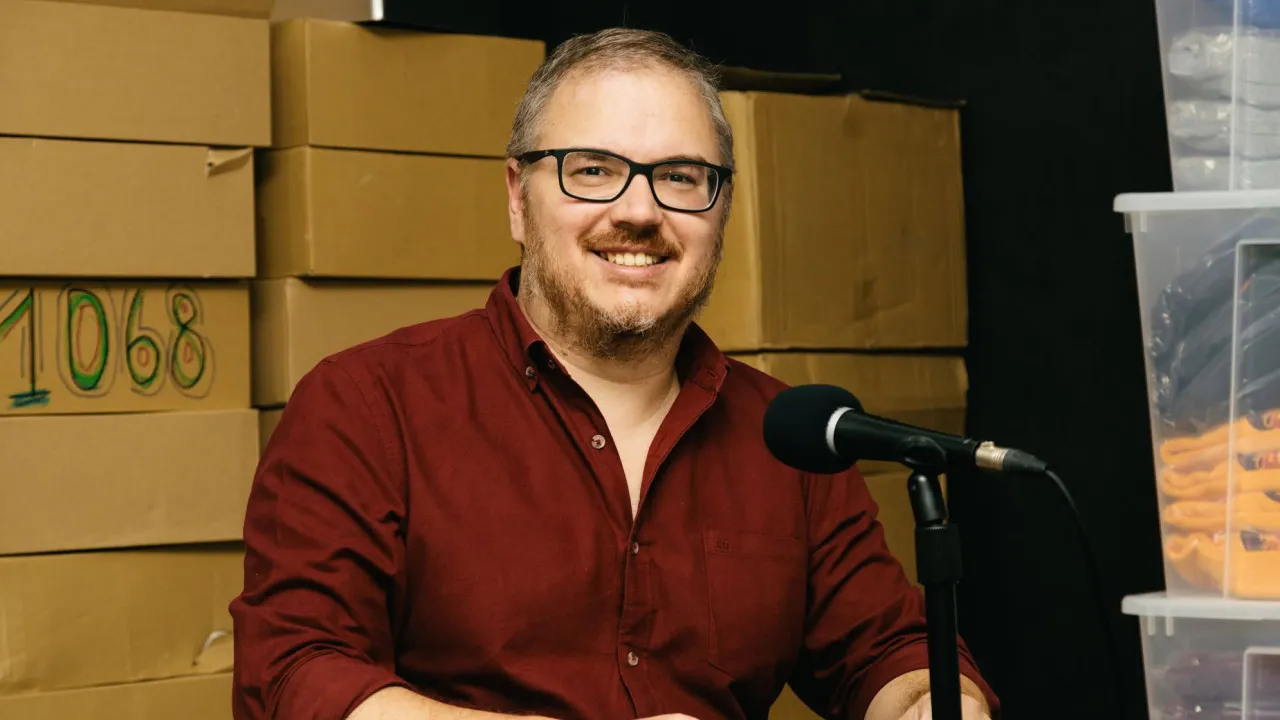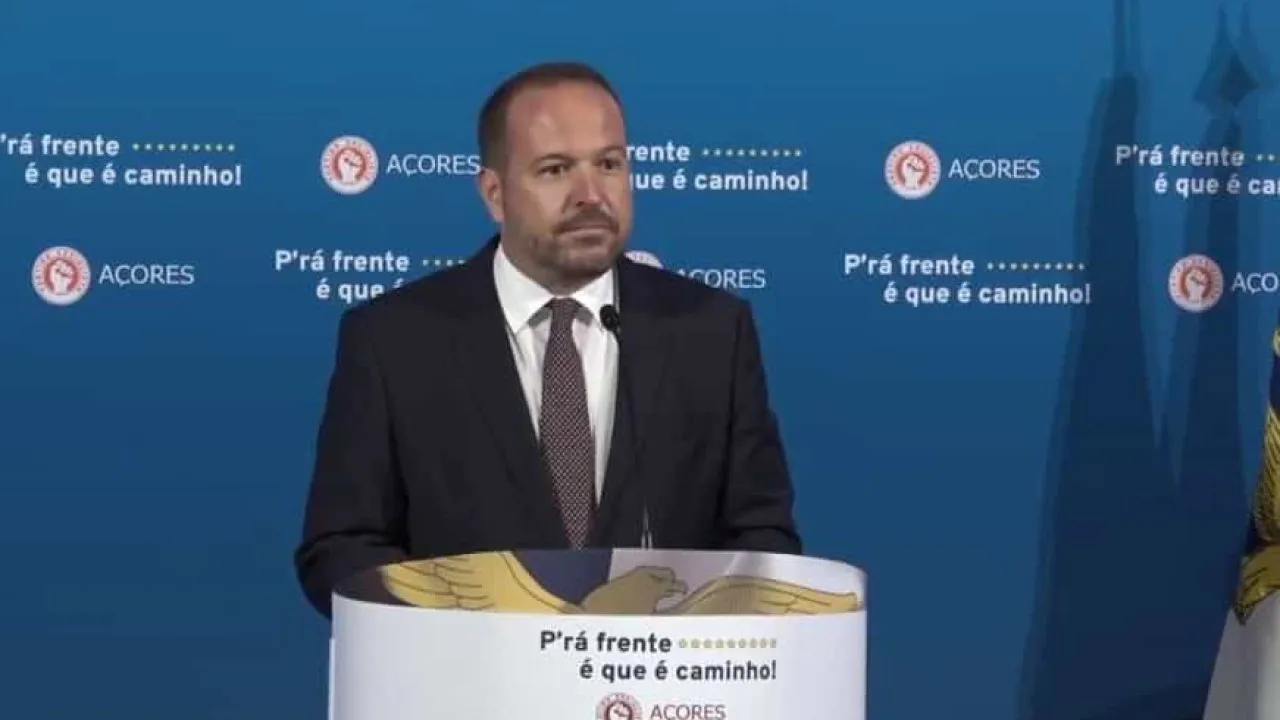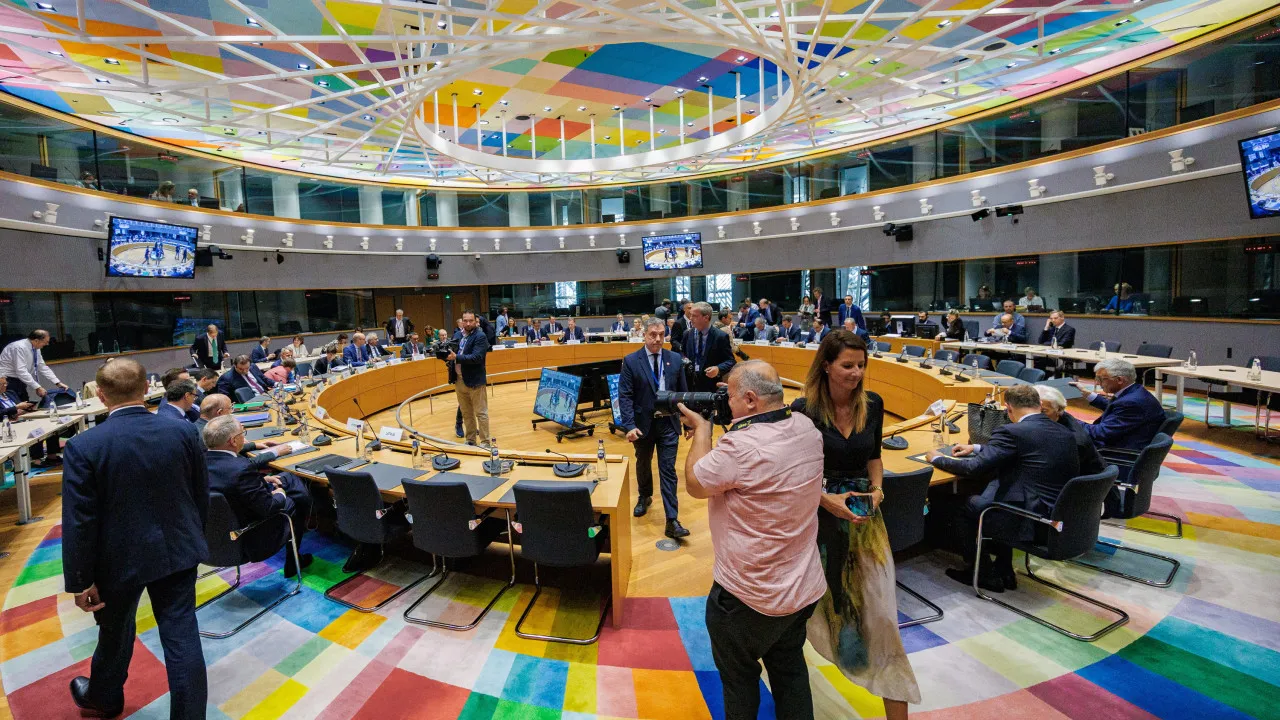
It was through videos explaining the history behind words, along with other peculiarities of the Portuguese language, that Marco Neves became known on social media. Every day, whether on Instagram or TikTok, the professor and translator surprises his followers by unveiling the secrets of expressions that are so familiar to speakers of Camões’ language.
In a conversation with Notícias ao Minuto, he discussed the increasing influence of the English language on young people, the rise in Brazilian content consumption among the younger generation, and the misconception held by some that better Portuguese is spoken in certain parts of the country, namely Lisbon and Coimbra.
When did this passion for words begin?
As a child/teenager, my dream was to be a historian, but I have always loved languages. I ended up studying Languages and Literature, but my passion for history never faded, and therefore, what I truly love is the history of language and words.
Do your students give you ideas for videos to make for Instagram?
Sometimes they do… I teach mostly in the area of translation, which combines linguistics, history, and a more practical aspect. I teach students who are studying to become translators, but also Portuguese or English teachers. We discuss some topics that make it into the videos, but there is no direct connection.
How long have you been teaching?
Since 2011, it will be 14 years.
I have nothing against English, I think it’s great that people know it, but reaching a point where the younger generation only reads in English is concerning Do you notice differences in the way students reach university?
I know that most of my colleagues would say students arrive less prepared, but that’s a strong trend… Of course, students change and have other interests. One thing that surprises me is that there is not as much ease with new technologies as people think younger individuals have. I see many people aged 18/19 struggling to work with computers, not with mobile phones.
Regarding language—and this is my impression—students are reading more in English. My English colleagues say students write better than they used to, while my Portuguese colleagues say they write worse.
It’s a curious point that concerns me a bit. I have nothing against English, I think it’s great that people know it, but reaching a point where the younger generation only reads in English is concerning.
Why is that happening?
There is a more international community of interests. People want to have immediate access to a book, and it is released first in English. Some countries are trying to counteract this by releasing translations simultaneously or even before the original. Things are more accessible in English—and cheaper, which is also a factor.
We can complain a lot and shout that people should read more in Portuguese, but the only solution is to publish things in Portuguese that people want to read, and for translations to come out quickly.
We’ve always had a language of prestige in Portugal. In the 16th century, when Camões wrote, it was Castilian; he imitated and used Castilian words This sense also explains why English expressions have become increasingly popular.
It’s not translators’ fault because they actually take care to find the right word; it’s society in general, which by communicating so much in English, ends up using these words.
Turning to the historical aspect: we’ve always had a prestigious language in Portugal. In the 16th century, when Camões wrote, it was Castilian, he imitated and used Castilian words (I say Castilian because at the time no one said Spanish). Then it was French, from the 18th century it was the language everyone imitated.
We all learn English in school, which is good, but we have this natural tendency to be particularly fond of one language. I have nothing against foreignisms from the outset, because they’ve always happened; what I say is that we are on a very poor diet, only relying on English.
We need to be careful in using Portuguese words knowing that in some cases it is inevitable for English words to come in. We need to be attentive and not allow what has happened in other societies where we use so many words from a language that suddenly we’re using that language. I may be exaggerating, but it happens.
Next door in Spain—it’s a very different situation—but those other languages aside from Spanish, like Galician, were a language of almost 90% of the population a few years ago, and now it’s less than half. People started using Spanish more and saw their language almost disappear. We need to be careful so that in a few years we don’t have kids only speaking English among themselves.
In Portugal, we have this mentality that ends up being accurate in the European context, where we speak a small language, little spoken in Europe. This leads us to have some insecurity and think we must speak other languages It seems that there has always been an inferiority complex concerning the Portuguese language, not being considered as ‘cool’.
We have a mentality where we say offhandedly ‘Portuguese is spoken by over 200 million people,’ but we know it is spoken mostly in South America, Brazil, and Africa.
In Portugal, we have this mentality that ends up being accurate in the European context, where we speak a small language, little spoken in Europe. This leads us to have some insecurity and think we must speak other languages.
People are very surprised when I say there are thousands of people learning to speak Portuguese across Europe, and it’s not just because of Brazil; many want to learn European Portuguese. In fact, when I go to Galicia or even here to Badajoz to talk to some students, they complain that the Portuguese don’t let them speak Portuguese because they’re so used to Spaniards not wanting to speak Portuguese that we immediately turn to Spanish or ‘Portunhol’.
Sometimes we also need to acknowledge that our language, although not the most spoken in the world, is not a language spoken so little, and more people are interested in it. We need to have a little more pride about it (even though it’s a dangerous word).
Faced with the influence of Brazil and English (which is much greater), the irritation only goes towards Brazilian Portuguese Speaking of Brazil, how do you see this trend of children using Brazilian expressions, gerunds, etc.?
We have a superiority complex within the language and then an inferiority complex regarding other languages. Faced with the influence of Brazil and English (which is much greater), the irritation only goes towards Brazilian Portuguese.
Brazilians create many materials for the internet; if Portuguese people think kids are watching too many things in Brazilian Portuguese, there’s only one solution: produce similar things in Portuguese from Portugal. So, create materials, and maybe kids will follow.
We will have some expressions that will come in; I don’t think we’ll have a different accent; it doesn’t change like that. It’s not because of videos that kids will start speaking with a different accent How do you foresee the future regarding the influence of Brazilian Portuguese over European Portuguese?
We will have some expressions that will come in; I don’t think we’ll have a different accent. It doesn’t change like that; it’s not because of videos that kids will start speaking with a different accent; they can have some influence, but the pronunciation of words happens through the group of friends and family. That’s why Brazilian children here generally, not all, acquire the Portuguese accent.
It’s not a concern concerning phonetics. Regarding expressions, it could happen, but I also turn this a bit in the opposite direction. We’re living in the first era in the last 100 years where, despite everything, some Brazilians in Brazil hear the Portuguese—there are few, it’s very disproportionate—but because of the internet, there starts to be a YouTuber here and there who begins to be listened to in Brazil. I don’t have a very catastrophic view of this.
But some people have this catastrophic view. I remember one of the videos where Marco explained the meaning of “Brazilian Guiana,” a joke often repeated lately.
[Laughs]. Yes, but that was to show that we can also have humor. Sometimes I tell Brazilians that we discuss the language a lot, but that proves we’re still speaking the same language. We’re closer than we think. We still can communicate well.
In fact, we communicate so well that kids watch Brazilian videos; they don’t do it because someone forces them. We have this inferiority complex that if something comes in English, it’s better, and kids don’t have that. So, if they have a video in English and in Brazilian Portuguese, of course, they will choose the latter. It’s just that phenomenon that’s behind the success of Brazilians among Portuguese kids.
It’s not better spoken either in Coimbra or in Lisbon. In truth, all the country’s pronunciations are traditional, and northern ones are even older than southern ones This difference is felt within the country itself, as there has always been a superiority complex regarding the Lisbon accent compared to the North and other regions of the country.
In terms of regional accents, I think we’re doing a bit better, we’re starting to respect each other more, but there’s still a tendency that anyone coming to radio or television in Lisbon will naturally assume an accent from here. There’s this idea that to speak publicly, we must use a particular accent. These are still remnants of this internal superiority complex that we think there’s a much better way to speak, which resembles Lisbon’s and Coimbra’s; Coimbra is always involved, though this is debatable for several reasons, because it’s not quite the entire population of Coimbra.
People talk about Coimbra because it was where the children of Lisbonians went to study, so they included Coimbra in the package of where it’s best spoken. But it’s not better spoken either in Coimbra or in Lisbon; these are simply the centers of power where the media was, so the way of speaking in these areas had a lot of influence and led to this wrong conclusion that it is the correct way, while in truth, all geographical pronunciations in the country are traditional, and northern ones are even older than southern ones.
There were numerous cases of people in the media who had lessons to lose their accents.
Which were probably called diction lessons. But someone can have any accent and still have clear diction. And contrary to what people think, this doesn’t happen in all countries. Even in England, the BBC today has all sorts of accents.
If Camões landed in Lisbon today and started speaking, from the data we have, it’s quite likely that we would identify the accent as being more from the Beiras area. People would say ‘this person is not from Lisbon’, and he was from Lisbon So it’s not even worth asking in which region of the country is the Portuguese best spoken.
Exactly. An individual person might not speak well, but if we’re talking about a pronunciation from a region, people are simply speaking as they learned.
I’m sure that if Camões landed in Lisbon today and started speaking, from the data we have, it’s quite likely that we would identify the accent as being more from the Beiras area. People would say, ‘this person is not from Lisbon,’ and he was from Lisbon.
As you say the language is a living organism, there are words that even being mispronounced end up staying that way over time.
Speakers decide for better or worse. If there’s something people don’t like to say, they just don’t say it. Everything we have in Portuguese—the verb forms, the pronouns—are gradual changes over time since Latin and before. These changes, when they started appearing, were seen as mistakes. They are small mistakes that accumulate, and I know this irritates many people, but that’s how languages are created.
Is there any rule in the Portuguese language that Marco would change?
Just to make teaching easier for foreigners, there’s one thing: we have two participles—the ‘pago’ and ‘pagado’, ‘aceite’ and ‘aceitado’. In an alternative world, if it were up to me, I might clear up this rule a bit.
The New Orthographic Agreement aimed to clean and standardize everything, but it altered the orthography at a time when almost everyone already knew how to write, which naturally led to resistance. It altered the orthography but didn’t solve the problem For example, concerning the New Orthographic Agreement, do you think the changes made sense?
This might be a contradictory opinion, but orthography is very different from language rules, which are planned. Regardless of the agreements created over time, [orthography] is based on a document commissioned during the First Republic, initiated the previous year, which aimed to tidy up the Portuguese orthography because it was chaotic, with no fixed rules.
The New Orthographic Agreement aimed to clean and standardize everything, but it altered the orthography at a time when almost everyone already knew how to write, which naturally led to resistance. It altered the orthography but didn’t solve the problem.
Firstly, between Portuguese from Portugal and from Brazil, differences are elsewhere—the vocabulary, the pronunciation, with orthography being a detail, and having tampered it left many differences intact.
Moreover, it created an even more complicated situation, as Angola and Mozambique did not accept the New Agreement, so we ended up with three orthographies: we now have the Agreement’s orthography in Brazil, the Agreement’s orthography in Portugal—which are not the same—and that of Angola, which stayed with the old orthography.
That’s why I don’t like the agreement very much; it wasn’t very useful, it wasn’t as necessary, and it ended up creating an even more complicated situation.
The work of a translator is now turning into a revision task, but interestingly it’s not an easier job; it’s usually more work As a professor, how do you see the use of artificial intelligence in writing and translation? Do you think your profession as a translator might be threatened?
Automatic translation started being studied in the 1950s, which was thought could be achieved quickly, but then it was realized translation is much more difficult and languages are complicated.
The truth is, over the last 20 years, through more advanced methods, automatic translation reached a point where it does a more reasonable job.
Today, in many cases of technical translation, it is a post-editing task; we have an initial automatic translation phase and then correction by the translator… literary translation is another niche.
With artificial intelligence, we’re seeing for English that the quality of automatic translation is already good enough to replace human translators in some cases of less important or complex texts, but for Portuguese, it’s very rare.
Of course, if I have news in Norwegian, I’ll put it in Google Translate or DeepL, but if it’s to be published in a Portuguese newspaper, it needs alteration. The work of a translator is now turning into a revision task, but interestingly it’s not an easier job; it usually takes more work.
All technological changes have their consequences, but what hasn’t happened until now is the disappearance of translators. There’s a joke among translators that we are always five years away from disappearing, but they never disappear, they’re always needed.
And what about the Portuguese language?
Artificial intelligence has some consequences, sometimes a bit strange. For example, we know that ChatGPT leads to using certain types of phrases or expressions, and there are people who avoid those expressions.
There’s a myth that says AI uses many dashes, and there are people who say they don’t want them to avoid seeming like they’re using AI.
And at the university?
If the tasks assigned to students can be done without any quality by ChatGPT, the problem is with the tasks [laughs]. We have to integrate the tools themselves and explain what can and cannot be done, performing exercises that go beyond what AI can do, and one of the trends we’re seeing at universities is the return of oral exams, all done live and with less writing.
Can ChatGPT help the Portuguese write better?
I think it can help the Portuguese in those particular cases like when, for example, we have to write a letter to the Tax Office, to Social Security, or to make a request of some kind… Mind you, I’m not advising people to replace lawyers with ChatGPT, but I think it helps the Portuguese communicate and translate what the public administration says.
Does Marco face resistance from people in his videos? After all, everyone knows how to speak Portuguese…
We have this somewhat false idea that we know a lot about the language, but we don’t. This leads to some rather strange debates.
I’ll give an example. We learned in school that there are five vowels, but we’re talking about the letters, but the vowels in spoken Portuguese are 14. When I say that in European Portuguese (as in Brazil, there are fewer) there are 14 vowels, people react very negatively because they think I’m saying something against what the primary school teacher said. But the vowel has two meanings: one is the letter, and the other is the vocalic sound. The first time I mentioned this in a video, the reactions were very negative, which surprised me.
What is speaking good Portuguese for Marco?
It’s about doing with Portuguese what we want. If I want to write a letter to solve a problem with the tax office, write that letter well. If I want to write a story and make someone emotional, I have to write good Portuguese. Of course, in all this, there are rules of etiquette and orthography, and although people focus a lot on them, they’re a kind of varnish.
Good Portuguese is being able to communicate and express what we want using the resources we have. It’s about having a broad enough vocabulary to explain things, to know the things in front of us. If we want to do something with the Portuguese language, we have a series of resources—vocabulary, intonation, gesture—that we can use.




